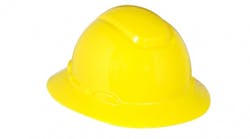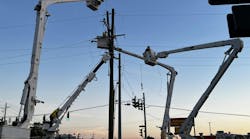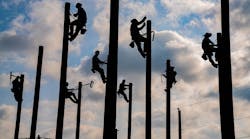I’ve thoroughly enjoyed working on this year’s linemen supplement, particularly since I have many memories of working with linemen. Most of those experiences were good, some were life-changing. In fact, I wouldn’t even have gone to work for a utility right out of college if it had not been for a former lineman: my father-in-law, Charles Little.
Charles had been a lineman in Northern California during the depression. He loved to hunt and fish and explore. Hanging from a pole, getting the lights back on during storms and other lineman-type exploits suited his adventurous soul.
But then something went wrong when he was up on a pole during a storm. A line that wasn’t supposed to be energized was. He was working with a green lineman who froze and couldn’t help him. Other linemen came to help, and eventually he was lowered down and somehow resuscitated. After a long period of recovery, he returned to work, this time at a desk job as a mapper/estimator. He missed the outdoor physical work, but with his hands-on experience, he did extremely well in his new position. So well in fact that he was encouraged to take correspondence courses in engineering. Eventually, he was promoted to engineer and then district electrical engineer.
Sometime after that, I married his daughter, finished my schooling and looked for work as an engineer. I was more into aerospace, but Charles convinced me that there were enough challenges in the power industry to hold my interest, particularly as a first professional job. He was more than right about that!
Eventually, company politics, budget meetings and general bureaucracy wore him down, and he took early retirement. In his heart, he was always a lineman, but he had the ability to be a good engineer. What I learned from Charles was that linemen have a lot of capabilities and talents that are not always apparent.
I’ve also learned that good linemen can be stubborn and hardheaded. I found that out the hard way by using some gruff old timers in several field research projects. These were folks a bit past their prime when it came to climbing poles. That allowed us to use them with the union’s blessing in areas slightly out of their job description. But they certainly weren’t out of their prime when it came to giving their opinion on just about everything they thought the engineers were doing wrong, which was, well, just about everything. They’d do what they were asked, but you could just about hear the squeaks of their eyeballs rolling when they thought the directions were nutty or they couldn’t see any point. On my part, I referred to them as crustaceans, but not to their faces.
I learned to treat those guys (and one woman) with respect and get their ideas at the beginning of a project. That way, we became partners and got a lot more done. One of the young engineers tried ordering a crew to install fog-sensing devices on several coastal transmission towers. The linemen had some ideas for mounting the equipment that didn’t quite jibe with the young engineer, but he wouldn’t listen. As a result, he got to wait for the rigger, wait for the mechanic and wait for the electrician to arrive over a period of days. “Union rules, ya’ know. Can’t rush things.” So it took a week to get something done that would have taken a few hours if the engineer hadn’t tried to pull rank. Treat these folks poorly and you’ll get some payback.
Line work is dangerous. Based on statistics, electrical line work is in the Top 10 most dangerous jobs, with higher fatality rates than firemen or police. I came to appreciate that more than ever when I was brought in as an expert witness in a case involving a young lineman who was killed while trying to restore power to a home during a storm. The duty required me to study the photos — images I’ll never forget. I got to know something about his young family, and about his hobbies and ambitions. I got to see how little was made of his death in the local papers. I developed a huge appreciation for the risks that linemen take and for the courage of their families.
In the last few years, particularly with all the major storms, line workers have taken on a new role: They’ve become ambassadors of good will at a time when the utility industry needs to polish its public image a bit. A recent survey indicates that utility customers have lost considerable trust and confidence in their electric providers. The reasons for this loss of trust are difficult to pinpoint as customers are bombarded with multiple sources of information on smart grid initiatives, smart meter resistance, alternative energy initiatives and global warming controversies, while dealing with storm-related outages and other utility-related issues. However, there’s no question that electric customers really appreciate the crews that turn the lights back on. There’s something comforting about seeing a line truck in the neighborhood, even when everything is okay. Of course, the media coverage of recent storms has shown even more what these men and women can accomplish under the worst conditions.
We need executives in their offices giving high-level direction, and progress requires the engineers in cubicles to ponder exotic, new technologies. And we can hope that when folks think of their power provider, they think more about those talented, capable, courageous, often hardheaded ambassadors wearing hard hats.


